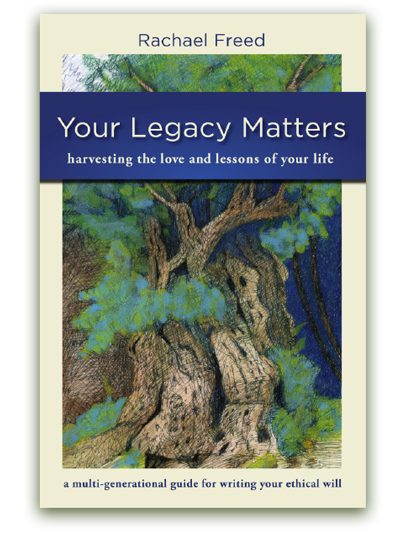From Chapter 10 of Your Legacy Matters
Cleaning Out Your Closet
In this chapter, we’ll explore two different closets. First, we’ll assess the legacy value of the material things we have in our physical “closets.” That’s the stuff that we’ve been given, that we’ve gathered and collected, and haven’t given, recycled, or thrown away. Then we’ll look inward to see which of our feelings and thoughts need to be cleaned out and which would be valuable to share with those we love.
Physical “Stuff”
We’re used to hearing that our stuff has no value, and that we can’t take our possessions with us. I disagree. Let’s look through the lens of the value of our stuff, beyond the material value (although we spend lots of money on stuff, and on homes to house our stuff).
What about the things we’ve inherited, that help us stay connected with loved ones who are now gone? What about mementos from important trips, and that we’ve received as gifts from a beloved? These objects are infused with personal and familial meaning. They stand as symbols of our identity, our values, our relationships. But there’s other stuff….
Respecting your personal timetable, there is another consideration: an urgent reason not to procrastinate. The hard reality is that we could lose all our stuff in a heartbeat. Many of us know people who’ve lost everything: in a fire, a tornado, or a flood. Letting go as a regular exercise helps us to be prepared emotionally when stuff or the loss of it is beyond our control for any reason. Letting go is a task for all of us at every season of our lives.
In my letter celebrating my daughter on her fortieth birthday this paragraph recalls her learning to organize her stuff. You may find it instructive.
“You were always on the go, like a whirlwind and then I’d find you fast asleep in a doll bed, on the living room floor, or in your tiger toy box. One day when you were about four I sent you to clean up your room and a half hour later I found you there, sitting in the midst of the mess, paralyzed and in tears. You said you didn’t know what to do; it was just too much. I sat down with you, and we made four piles: one to throw away, one to give away, one to keep, and one to decide about later. Soon we were done; you were all smiles again and ready to play. We could see your bright yellow carpet, and you had room to cartwheel again. Today you are a superb organizer, whether the challenge is a closet, a house, or a corporation, and you do it with that “cartwheeling” spirit with which you face all the challenges in your life.”
What is our responsibility to de-clutter as we age, respecting the next generation who will have to clean up our stuff after we’re gone?
I’ve imagined dying suddenly, and watching from somewhere as my two children wander through the morass of my things: paper, books, pictures, collections, and accumulated mementos. Not only is it an unfair burden to leave them, but my stuff makes a statement about me.
I ask myself, “How will they know the junk from the stuff with meaning? What might they conclude about their mother who holds on too long and too much?” I imagine their resentment being left to go through my things because I didn’t take the responsibility to leave life expressing what I ‘say’ I value, including simplicity, order, and beauty.
Physical Transitions and Stuff
Gerontological wisdom suggests that the things elders choose to take
with them in the complex transition of surrendering private, independent homes for communal housing, are powerful aids to maintain
coherence and continuity of identity. This stuff is emblematic of belonging, kinship, and relationship, all basic and universal human
needs throughout life. They are reminders of life history, achievements,
and life roles. Precious objects support security and the dignity
of each individual’s life. Even when memory fades, this special
stuff can provide comfort.
“The power of everyday things carry both ideas and passions… emotional and intellectual companions that anchor memory [and] sustain relationship….” — Sherry Turkle
Coherence and Continuity
Mary Ruhr, a legacy writer wrote her Master’s thesis with the hypothesis
that our stuff functions to enhance continuity and coherence, especially
in a transition as complex as leaving our more spacious homes for a life
with limited private space and impersonal public dining and recreation
space. Her field-study included living in a nursing home for a month,
becoming friends with residents, and being invited to their rooms to
share stories about the things they’d brought with them when they’d
left their homes.
We hear about people leaving a hospital or rehabilitation center not for home, but for strange new permanent quarters. Following hospitalization and with no warning, the mother of my friend was transferred directly to a nursing home. There’d been no time to gather her things. As she sat in the bleak room — lost in her new “home,” staring into the distance, she said to her daughter, “I feel like a refugee.” How unprepared they were for this heartbreaking transition.
An artist friend of mine intuitively understood how disarming and difficult this move might be for his partner after hip surgery. He brought her favorite paintings and part of her miniature collection of porcelain and pottery animals to the rehabilitation center, her temporary home after leaving the hospital. Beauty and familiar objects helped her to regain her psychic balance after surgery, anesthesia, and pain medications.That stuff and more went to their new apartment because she could no longer negotiate the stairs in their previous home of many years.
“...even though you’re far away from home, you start to feel okay, because after all, you do have some of your stuff with you.” — George Carlin
We don’t know when a fall or sudden onset of an illness will change our reality. Thus I advise legacy writers to spend some time journaling about favorite objects and their meaning. Sharing this information in a legacy letter to a close relative or friend (and identifying/marking the special stuff) helps insure that should circumstances cause you to make an unexpected move, those things that mean something to you will accompany or follow you. This information can inform professionals hired to pack up and dispose of the household in a transition, if your loved ones are unavailable or live in far away from you.
“To us, our house was not unsentient matter - it had a heart, and a soul, and eyes to see us with; and approvals and solicitudes and deep sympathies; it was of us, and we were in its confidence, and lived in its grace and in the peace of its benediction.” — Mark Twain
Younger generations need to encourage their elders to choose things to accompany them before the transition becomes a reality. Even the most compassionate professional caregivers or movers can’t know the history or the meaning of personal objects of a lifetime. We can consciously strive to diminish our elders’ vulnerability and enhance their sense of dignity and empowerment as they confront the inevitable passage of illness or aging.

